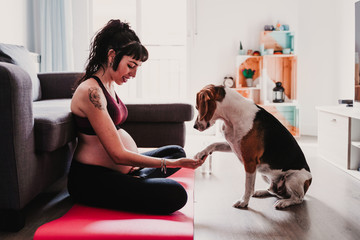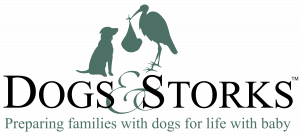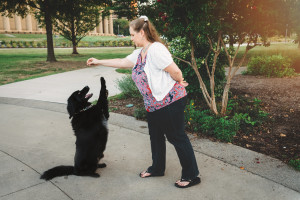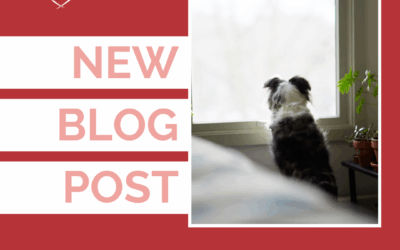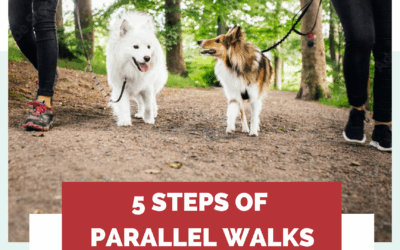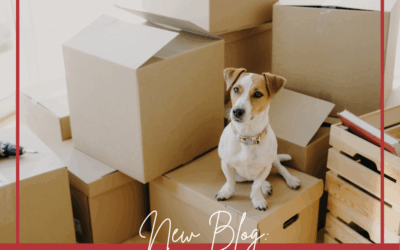As a licensed Family Paws Parent Educator and a certified behavior consultant whose speciality is fear and aggression, I work with a lot of families with dogs and kids. Some contact me ahead of time, to help prepare their dog, or address concerns before the baby arrives while others don’t realize their dog is uncomfortable with the baby until after the baby comes home. It’s always better to be proactive than reactive, so with that in mind, I thought I’d review some ways you can be proactive and start to set everyone up for success from the beginning. Of course there’s many more (and more important!) things that need to be done than what I’ve listed here! You may also be interested in my Bringing Home Baby blog series here.
If you’re in the NYC area, consider attending my upcoming Dogs & Storks class at Grand Street Healing Project in Brooklyn, NY to make sure you’re fully prepared. We will cover so much more than what I’ve listed here and it will provide an opportunity for me to answer specific questions that concern you. Registration information is here. (CLOSED/EVENT WAS IN 2020) I’d love to meet you in person and this is a great class! (If you are expecting and can’t make it to our Brooklyn event, consider our remote phone session or video options. )
Five Things To Do For Your Dog Before Your Baby Arrives:
1. Check your dog’s medication stash and get check-ups done. Get a full physical exam and make sure Fido isn’t going to be due for any routine vet care or prescription (including flea/tick and heartworm preventatives!) in the first month or two after you give birth. You’ll have a lot going on without trying to schedule a vet appointment for vaccines or a blood test for heartworm preventative. Of course emergencies come up, but routine stuff you can plan ahead a bit.
2. Get your dog familiar with whoever will be helping out after the baby arrives. This might be a neighbor, dog walker, baby nurse or extended family. But whoever is going to be coming and going a lot after the baby arrives, take the time now to get your dog well socialized to them.
3. Review and practice basic obedience. Truth time. It’s time to be really honest about how trained your dog really is. What might have been acceptable behavior before you were expecting a baby, may not be OK now. Jumping up, pawing or barking for attention, not responding to verbal cues on the first ask. Maybe these weren’t a problem before but it’s pretty hard to give a dog a hand signal when you’re holding a newborn so you might need to channel some resources into extra training now. If you need help, find a qualified trainer and consider day training, where the trainer trains the dog and then transfers the skills to you. This may be an effective way to get the behaviors taught more quickly than you working on them yourself, especially if your due date is nearing.
4. Practice at home separation. Is your dog comfortable being separated by a gate, crate or closed door while you are home or does your dog have a little FOMO and has a meltdown if he’s not involved in everything? There will be times once the baby arrives that your dog won’t be part of the action, and we need to help make sure he’s comfortable with that.
5. Get your dog on a flexible schedule. Dogs generally really like routine and some dogs get upset if their routine changes. But, once the baby arrives, schedules are out the window and Fido may not get his regular walk promptly at 8am (unless you are paying a dog walker to come and walk him), so leading up to the baby’s arrival, mix things up a bit. Try to not be so glued to meal and walk times and help him adjust to things being in flux. Once there’s a newborn on the scene, chances are pretty good dinner for Fido won’t always be at 6pm, and we don’t want him pestering. The more we keep his schedule in flux leading up to the birth, the more likely he will be to roll with things once the baby arrives.
Of course there is a whole lot more to do than these five things, but you’ll be off on the right foot if you start here. As a Family Paws Educator I am uniquely qualified to help you through all of these transitions from baby’s homecoming to toddlerhood. And, as a certified behavior consultant, I can guide you if your dog starts to growl or show other signs that he’s uncomfortable once the baby comes home.
If you are expecting and can’t make it to our Brooklyn event, consider our pre-baby prep session We review management, enrichment, training, homecoming plans, reducing attention seeking behaviors and provide you with over a dozen handouts with important information on making this transition safe and happy for everyone in the family.
If you would like some additional guidance or have other questions, contact me.
Happy Training!
–Kate

